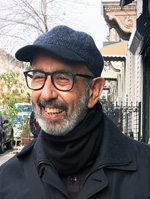
LOUISVILLE, Kentucky — Robert Mitchem III started as a student at Jefferson Community College in the fall of 1991. I started the same year as an instructor.
Robert enrolled that semester in one of my reading classes at the downtown Louisville campus. Twenty-two years later, with some gaps in between, Robert was back, in another of my classes. On Oct. 1, 2013, he took over the class and turned it into the best day of my teaching career.
This spring, at 55, Robert III was approaching what would have been one of his best days ever: completing his associate’s degree program at Jefferson. He did earn his degree, but it wasn’t the celebration he had anticipated: On March 26, his son, Robert Mitchem IV, was killed in an apparently random shooting in the West End of Louisville. Police have yet to identify a suspect.
Back on October 1, 2013, Robert III was sitting in my classroom across from Jacob, a home schooler from a fundamentalist Christian family. Robert, 49 at that time, is Black. Jacob, then 17, is White.
Technically, the best writer in the class, Jacob (not his real name) didn’t understand how little he understood about the world outside his community. Writing about the U.S. Supreme Court’s 1954 Brown v. Topeka Board of Education decision on school segregation, he had turned in a technically flawless, but icy, first draft, missing a sense of understanding how Brown v. Board dramatically changed people’s lives: Black and White.
The students were revising their drafts, when I overheard Robert ask Jacob what his topic was. When Jacob told him, Robert said, matter-of-factly, that he was a student in Louisville at the start of busing in the mid-1970s, long before his son was born. It was clear that Jacob didn’t understand the connection between integration and busing.
What happened next was magic. In a gentle, story-telling way, Robert explained to Jacob what it was like to integrate all-White schools in White neighborhoods. Robert calmly described stepping off a bus every day and walking a gantlet of sign-wielding, name-calling Whites, some telling Robert and other Black students to go back where they came from, some suggesting an uglier destination.
As Robert told his story, something significant happened. Engaged in what may well have been his first significant conversation with an African-American, Jacob was listening . . . and learning. And the rest of the class took notice, stopping to listen to Robert’s story. I simply stood aside and listened.
Jacob’s final draft demonstrated a sincere attempt to understand race relations before and after Brown, at a deeper, more personal level than I expected or could have engineered myself.
Jacob certainly was not now ready to launch a speaking tour on the Civil Rights Movement, but it appeared at least that his view of the movement and the world had changed. I tried to acknowledge that in responding to his essay, without making him a hero.
Later that semester, I was talking with a colleague who happened to be friends with Jacob’s mother. I told her about Robert and Jacob, and she asked if she could share the story with Jacob’s mom. I said yes, then asked why.
“It was her idea for him to go to Jefferson,” my colleague said. “She felt he needed a little experience to broaden his perspective.”
Jacob’s mother got what she wanted. I got a good story to tell. And Jacob got an education from the right person, Robert Mitchem III.
Over the following six-plus years, I’ve stayed in touch with Robert as he steadily closed in on graduation. Then, on May 5, the Courier Journal reported the death of Robert Mitchem IV, ten days earlier, in a seemingly random shooting. In a postage stamp-sized photograph accompanying the article, IV looked like a handsome young version of III, and his last name was spelled the same, not the less common Mitchum (as in the actor, Robert Mitchum).
I called Robert. Before I completed my first sentence, he said, “Yes, that was my little boy.” We meandered through a conversation, talking about his son, family, school. He asked about my family, talked more about his son and repeated a remark his daughter, Alexis Cooper, made at the time of Robert IV’s death: “He was in the wrong place at the wrong time.”
I told this story to a friend whose career is devoted to social justice. “He was in the right place,” she insisted. His neighborhood should be a place where a young man can feel safe, she wrote. “When will be the right time for people to feel safe in their own damn community?”
This is certainly not the right time for Louisville. Robert IV’s death added to a growing list of shootings (82 percent higher than last year, so far) and killings (up 63 percent) this year, including two well-publicized police killings of Blacks.
The elder Robert Mitchem and his Black classmates in 1970s Louisville suffered, simply because some White folks decided they were in the wrong place. Now his son is dead, shot down in his own neighborhood for no apparent reason.
Something is terribly wrong, and the pattern will be repeated again and again, with similar endings, until we – all of us – get it right.
*
Michael Ginsberg is a freelance writer based in Louisville, Kentucky.
I’m so sorry for Robert’s loss. Thank you for your thoughtful writing. Every bit of education helps all of us.
Sorry for his loss, but it’s happening all the major cities. I keep asking myself why, why